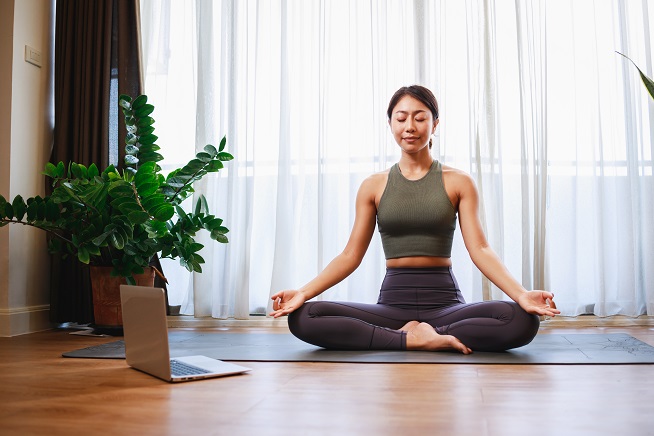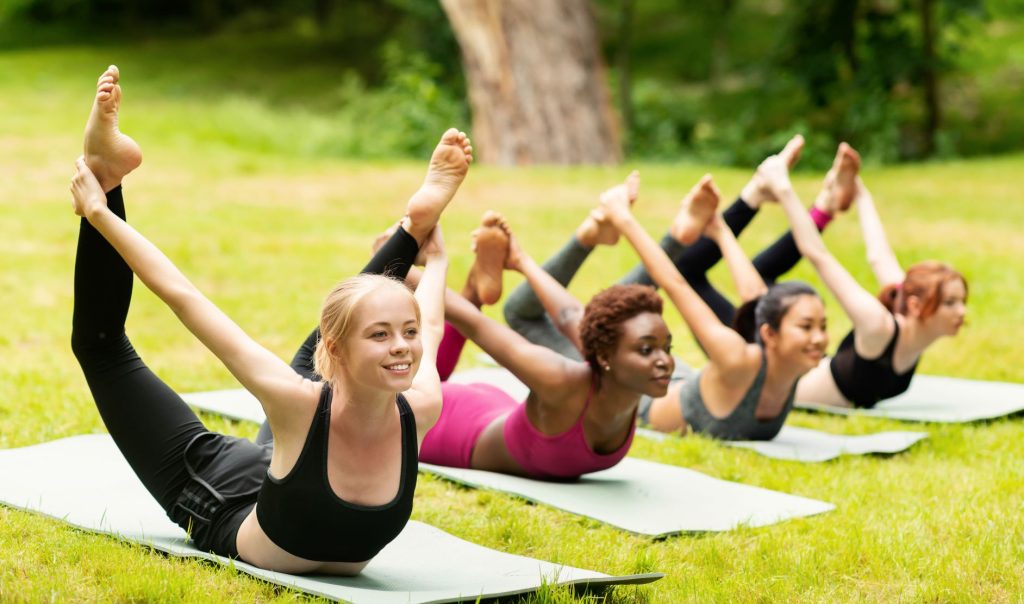The right ambiance is essential to a yoga space. Natural materials, such as wooden floors and calming music and lighting can create a peaceful environment. Using the right colors also helps – calming greens, light blues, and neutrals are ideal.
Bringing in natural elements, such as plants, is another good idea as they are not only soothing but help with breathing and improving mood.
Light Control
If you want to create a yoga room, a painting studio, a reading room, or merely a meditative space where you can relax, you need to give it some thought. The design of the room, the lighting, and even the furniture are important. There’s an underlying sense of calm that wafts over you when you enter a yoga studio, and you can recreate that same feeling at home.
When designing your yoga space, choose light colors that help to keep the energy calm. Using softer shades like light greens and sage, off-whites and soft pinks helps to mellow out the room’s energy. Avoid bright colors that may distract your attention from your drishti.
Large windows allow for plenty of natural light but you’ll want to ensure the sunlight doesn’t fall directly on your mat or you. Install blackout window blinds in order to silence the light and avoid distractions.
A few house plants instantly add that calming, nature-inspired feel to your room. They also serve as air purifiers, reducing dust and other pollutants in the room. If you don’t have a green thumb, consider repurposing an old ladder to create a tiered shelf to house your plants.
Consider adding meditative music, or a small fountain to your sanctuary if you want to use it as a place for meditation. It will create a relaxing atmosphere that will improve your mood, concentration, and overall well-being.
Finally, be sure to remove any clutter from your yoga space so that you can focus on your mind and body without distraction. You might even want to consider setting up a small altar in the center of your yoga space. You can place sentimental items, a candle, or some scented sage here to set your intention before your yoga session. You can learn more about how to create an inspirational home altar in this blog post. With these tips, you can transform any room into your very own yoga oasis and get the most out of your meditation and relaxation sessions.
Sound Control
Yoga is all about appealing to your senses in order to achieve a state that promotes mindfulness. The scent plays a major role in this, so adding live plants, aromatherapy, or candles to your space can help to relax you.
Another sensory element that is often overlooked is sound. There are several ways to add a tranquil tone to your yoga studio, including using calming music. A water fountain can also be a very soothing addition to your studio, as the sound of the running water has been known to aid in meditation and relax the mind.
Color is another factor to consider. Some yogis prefer light or neutral-colored walls to create a feeling of openness and cleanliness. Other yogis may prefer natural materials such as wood cladding for a more organic, down-to-earth feel. Some may want to add wabi-sabi elements such as a branch leaning on the wall or a stone floor in order to set the tone for their yoga retreat.
You can add personality to your retreat by adding motivational quotes and art paintings. These will increase your positivity. You may also like to include a small altar that you can use for placing an object such as a candle, flower or statue of your intention in order to set the mood for your practice.
It is easy to create the perfect home sanctuary for yoga. By planning your space and accessorizing it appropriately, you can transform your garden room into an environment that allows you to tune in to your inner self. To make sure you can always be prepared for your meditation sessions at home, it’s a good idea to invest in some insulating window blinds online that will not only keep the heat out during summer but will also provide warmth in winter.
Privacy
Whether you have an entire room to devote to your yoga space or simply a small corner in the living area, it’s essential that this space is completely separate from the rest of the home. This will keep the environment peaceful and prevent outside distractions when you are trying to meditate or focus on your breathing.
It is important to choose the right flooring for your space in order to make it feel clean and inviting. The best choice is an eco-friendly mat that will not only be gentle on your feetc but will also protect your practice from germs and bacteria. The Gaiam Sol Suddha Yoga Mat is made of eco-friendly TPE. It comes in a range of soothing colors that will match your yoga room. It’s also incredibly soft and non-slip, making it perfect for any type of yoga routine.
Once you’ve created the perfect spot, you’ll need to fill your space with calming decor. This can be as simple as a few natural artifacts and scented candles to set the mood. You can also add some plants for a natural feel. They will also help to clean and refresh the air.
Another way to make your yoga space feel special is to hang some patterned curtains or a wind chime to create a sense of tranquility. This will help you to relax and get into the zone for a better workout. It’s a good idea to not clutter the space with unnecessary objects. Too many items can cause you to become distracted and will ultimately make your space feel cluttered and disorganized.
Once you’ve gathered the essentials in your space, it’s now time to roll out your yoga mat and prepare for a peaceful practice. It’s a good idea to keep all of your yoga equipment neatly organized in the corner where you plan on practicing so that you can easily grab it when it’s time to meditate or stretch. Having all of your yoga supplies close at hand will also help to motivate you to use your yoga space more often, especially when the motivation starts to lag.
Temperature Control
If you have a large garden or spare room at home, it’s a perfect space to fashion into your own Yoga Sanctuary. You can use it however you like without affecting your family life or other obligations.
When designing your own Yoga room, you’ll want it to feel like a peaceful and relaxing place. Add a few plants to the space that will help purify the air. Succulents or cacti will do the trick, as they require little water and still add a natural touch.
Use calming colors to create a calmer atmosphere in your Yoga space. Certain colours can influence our mood, so it is important to choose colours that are soothing. Light greens and pastels are ideal as they can help to relax the mind. You could also hang some calming artwork to help you concentrate on your practice.
It’s also important to ensure that your Yoga room is well-insulated. This is especially important if you plan on using it for hot yoga as the heat in the room can quickly change from a comfortable temperature to uncomfortably warm. Insulation is measured using its R-Value. The higher the R Value, the better it will resist heat escaping.
Installing an additional layer insulation in a space with high ceilings can help keep heat in the room and reduce energy costs. You should also insulate any brickwork or walls that are present. If your studio is located in a older building with lots of glass walls it might be a good idea to invest in some thick curtains or a blind system that blocks all heat transfer and sunlight from entering the space during the day.
Another option for a Yoga space that can be used indoors or out is to use a portable heater with an R-Value of at least 22 and have it placed in the centre of your studio. This will allow all yogis to enjoy the same level of warmth and can help prevent heat distribution issues as some areas in the studio will be too hot while others are still cold.



